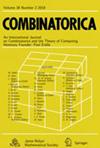Subsquares in Random Latin Rectangles
IF 1
2区 数学
Q1 MATHEMATICS
引用次数: 0
Abstract
Suppose that k is a function of n and . We show that with probability \(1-O(1/n)\), a uniformly random \(k\times n\) Latin rectangle contains no proper Latin subsquare of order 4 or more, proving a conjecture of Divoux, Kelly, Kennedy and Sidhu. We also show that the expected number of subsquares of order 3 is bounded and find that the expected number of subsquares of order 2 is \(\left( {\begin{array}{c}k\\ 2\end{array}}\right) (1/2+o(1))\) for all \(k\leqslant n\).
随机拉丁矩形中的子平方
假设k是n和的函数。我们以\(1-O(1/n)\)的概率证明了均匀随机\(k\times n\)拉丁矩形不包含4阶或4阶以上的适当拉丁子方,证明了Divoux, Kelly, Kennedy和Sidhu的一个猜想。我们还证明了3阶子平方的期望数目是有界的,并且发现对于所有\(k\leqslant n\), 2阶子平方的期望数目是\(\left( {\begin{array}{c}k\\ 2\end{array}}\right) (1/2+o(1))\)。
本文章由计算机程序翻译,如有差异,请以英文原文为准。
求助全文
约1分钟内获得全文
求助全文
来源期刊

Combinatorica
数学-数学
CiteScore
1.90
自引率
0.00%
发文量
45
审稿时长
>12 weeks
期刊介绍:
COMBINATORICA publishes research papers in English in a variety of areas of combinatorics and the theory of computing, with particular emphasis on general techniques and unifying principles. Typical but not exclusive topics covered by COMBINATORICA are
- Combinatorial structures (graphs, hypergraphs, matroids, designs, permutation groups).
- Combinatorial optimization.
- Combinatorial aspects of geometry and number theory.
- Algorithms in combinatorics and related fields.
- Computational complexity theory.
- Randomization and explicit construction in combinatorics and algorithms.
 求助内容:
求助内容: 应助结果提醒方式:
应助结果提醒方式:


